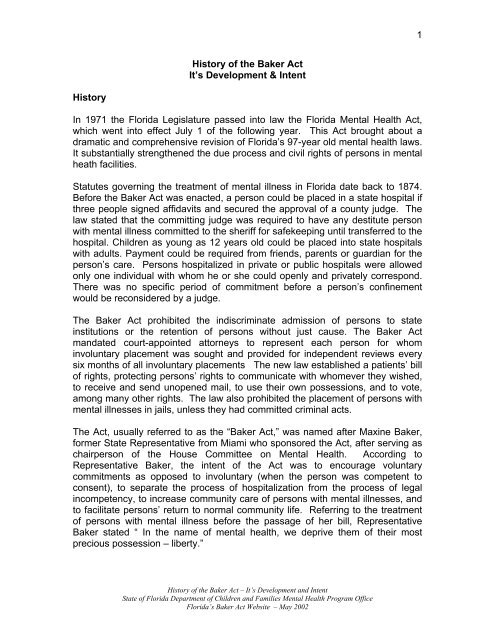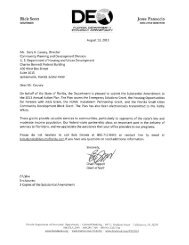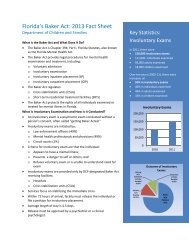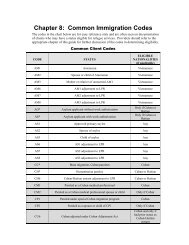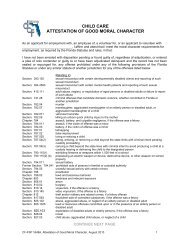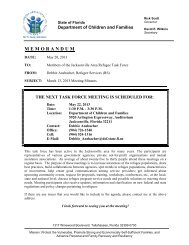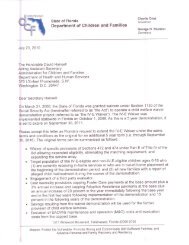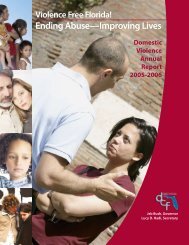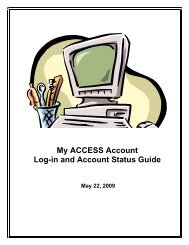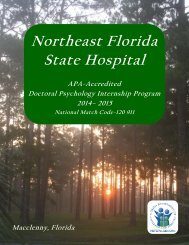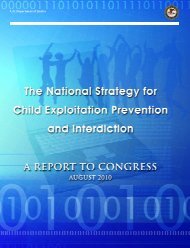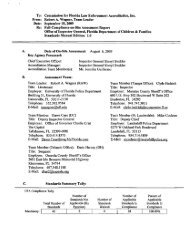History of the Baker Act - Florida Department of Children and Families
History of the Baker Act - Florida Department of Children and Families
History of the Baker Act - Florida Department of Children and Families
You also want an ePaper? Increase the reach of your titles
YUMPU automatically turns print PDFs into web optimized ePapers that Google loves.
<strong>History</strong><br />
<strong>History</strong> <strong>of</strong> <strong>the</strong> <strong>Baker</strong> <strong>Act</strong><br />
It’s Development & Intent<br />
In 1971 <strong>the</strong> <strong>Florida</strong> Legislature passed into law <strong>the</strong> <strong>Florida</strong> Mental Health <strong>Act</strong>,<br />
which went into effect July 1 <strong>of</strong> <strong>the</strong> following year. This <strong>Act</strong> brought about a<br />
dramatic <strong>and</strong> comprehensive revision <strong>of</strong> <strong>Florida</strong>’s 97-year old mental health laws.<br />
It substantially streng<strong>the</strong>ned <strong>the</strong> due process <strong>and</strong> civil rights <strong>of</strong> persons in mental<br />
heath facilities.<br />
Statutes governing <strong>the</strong> treatment <strong>of</strong> mental illness in <strong>Florida</strong> date back to 1874.<br />
Before <strong>the</strong> <strong>Baker</strong> <strong>Act</strong> was enacted, a person could be placed in a state hospital if<br />
three people signed affidavits <strong>and</strong> secured <strong>the</strong> approval <strong>of</strong> a county judge. The<br />
law stated that <strong>the</strong> committing judge was required to have any destitute person<br />
with mental illness committed to <strong>the</strong> sheriff for safekeeping until transferred to <strong>the</strong><br />
hospital. <strong>Children</strong> as young as 12 years old could be placed into state hospitals<br />
with adults. Payment could be required from friends, parents or guardian for <strong>the</strong><br />
person’s care. Persons hospitalized in private or public hospitals were allowed<br />
only one individual with whom he or she could openly <strong>and</strong> privately correspond.<br />
There was no specific period <strong>of</strong> commitment before a person’s confinement<br />
would be reconsidered by a judge.<br />
The <strong>Baker</strong> <strong>Act</strong> prohibited <strong>the</strong> indiscriminate admission <strong>of</strong> persons to state<br />
institutions or <strong>the</strong> retention <strong>of</strong> persons without just cause. The <strong>Baker</strong> <strong>Act</strong><br />
m<strong>and</strong>ated court-appointed attorneys to represent each person for whom<br />
involuntary placement was sought <strong>and</strong> provided for independent reviews every<br />
six months <strong>of</strong> all involuntary placements The new law established a patients’ bill<br />
<strong>of</strong> rights, protecting persons’ rights to communicate with whomever <strong>the</strong>y wished,<br />
to receive <strong>and</strong> send unopened mail, to use <strong>the</strong>ir own possessions, <strong>and</strong> to vote,<br />
among many o<strong>the</strong>r rights. The law also prohibited <strong>the</strong> placement <strong>of</strong> persons with<br />
mental illnesses in jails, unless <strong>the</strong>y had committed criminal acts.<br />
The <strong>Act</strong>, usually referred to as <strong>the</strong> “<strong>Baker</strong> <strong>Act</strong>,” was named after Maxine <strong>Baker</strong>,<br />
former State Representative from Miami who sponsored <strong>the</strong> <strong>Act</strong>, after serving as<br />
chairperson <strong>of</strong> <strong>the</strong> House Committee on Mental Health. According to<br />
Representative <strong>Baker</strong>, <strong>the</strong> intent <strong>of</strong> <strong>the</strong> <strong>Act</strong> was to encourage voluntary<br />
commitments as opposed to involuntary (when <strong>the</strong> person was competent to<br />
consent), to separate <strong>the</strong> process <strong>of</strong> hospitalization from <strong>the</strong> process <strong>of</strong> legal<br />
incompetency, to increase community care <strong>of</strong> persons with mental illnesses, <strong>and</strong><br />
to facilitate persons’ return to normal community life. Referring to <strong>the</strong> treatment<br />
<strong>of</strong> persons with mental illness before <strong>the</strong> passage <strong>of</strong> her bill, Representative<br />
<strong>Baker</strong> stated “ In <strong>the</strong> name <strong>of</strong> mental health, we deprive <strong>the</strong>m <strong>of</strong> <strong>the</strong>ir most<br />
precious possession – liberty.”<br />
<strong>History</strong> <strong>of</strong> <strong>the</strong> <strong>Baker</strong> <strong>Act</strong> – It’s Development <strong>and</strong> Intent<br />
State <strong>of</strong> <strong>Florida</strong> <strong>Department</strong> <strong>of</strong> <strong>Children</strong> <strong>and</strong> <strong>Families</strong> Mental Health Program Office<br />
<strong>Florida</strong>’s <strong>Baker</strong> <strong>Act</strong> Website – May 2002<br />
1
Since <strong>the</strong> <strong>Baker</strong> <strong>Act</strong> became effective in 1972, a number <strong>of</strong> legislative<br />
amendments have been enacted to fur<strong>the</strong>r protect persons’ civil <strong>and</strong> due process<br />
rights. The most substantial reform occurred in 1996 when greater protections<br />
were extended to persons seeking voluntary admission, informed consent <strong>and</strong><br />
guardian advocacy provisions were streng<strong>the</strong>ned, notice requirements were<br />
exp<strong>and</strong>ed, <strong>and</strong> suspension <strong>and</strong> withdrawal <strong>of</strong> receiving <strong>and</strong> treatment facility<br />
designations was specified, among many o<strong>the</strong>r revisions.<br />
Related Legislation<br />
It is important that <strong>the</strong> <strong>Baker</strong> <strong>Act</strong> only be used in cases where <strong>the</strong> person has<br />
mental illness <strong>and</strong> meets all remaining criteria for voluntary or involuntary<br />
admission. The <strong>Baker</strong> <strong>Act</strong> is <strong>the</strong> <strong>Florida</strong> Mental Health <strong>Act</strong> <strong>and</strong> it does not serve<br />
any o<strong>the</strong>r purpose. For many persons, <strong>the</strong> use <strong>of</strong> o<strong>the</strong>r statutes may be more<br />
appropriate. Alternatives may include:<br />
• Developmental Disabilities, Chapter 393, F.S.<br />
• Marchman <strong>Act</strong>, (Substance Abuse Impairment), Chapter 397, F.S.<br />
• Emergency Examination <strong>and</strong> Treatment <strong>of</strong> Incapacitated Persons <strong>Act</strong>,<br />
Chapter 401.445, F.S.<br />
• COBRA/EMTALA Federal “Anti-Dumping” law, 42 USC 1395dd<br />
• Access to Emergency Services <strong>and</strong> Care, Chapter 395.1041, F.S<br />
• Adult Abuse, Neglect, <strong>and</strong> Exploitation, Chapter 415.1051, F.S.<br />
• Advance Directive, Chapter 765, F.S.<br />
• Guardianship, Chapter 744, F.S.<br />
Intent <strong>of</strong> <strong>the</strong> <strong>Baker</strong> <strong>Act</strong><br />
The <strong>Baker</strong> <strong>Act</strong> is intended to<br />
• Provide comprehensive services for persons requiring intensive short-term<br />
<strong>and</strong> continued treatment<br />
• Provide emergency service <strong>and</strong> temporary detention for evaluation when<br />
required<br />
• Admit persons to treatment facilities on a voluntary basis when extended<br />
or continuing care is needed <strong>and</strong> unavailable in <strong>the</strong> community<br />
• Ensure that any involuntary examination or treatment be accomplished in<br />
a setting which is clinically appropriate <strong>and</strong> most likely to facilitate <strong>the</strong><br />
person’s return to <strong>the</strong> community as soon as possible<br />
• Guarantee that <strong>the</strong> individual dignity <strong>and</strong> human rights <strong>of</strong> all persons who<br />
are admitted to mental health facilities for examination or placement are<br />
protected.<br />
• Employ <strong>the</strong> least restrictive means <strong>of</strong> intervention based on <strong>the</strong> individual<br />
needs <strong>of</strong> each person, within <strong>the</strong> scope <strong>of</strong> available services.<br />
<strong>History</strong> <strong>of</strong> <strong>the</strong> <strong>Baker</strong> <strong>Act</strong> – It’s Development <strong>and</strong> Intent<br />
State <strong>of</strong> <strong>Florida</strong> <strong>Department</strong> <strong>of</strong> <strong>Children</strong> <strong>and</strong> <strong>Families</strong> Mental Health Program Office<br />
<strong>Florida</strong>’s <strong>Baker</strong> <strong>Act</strong> Website – May 2002<br />
2
Protections <strong>of</strong> <strong>the</strong> <strong>Baker</strong> <strong>Act</strong><br />
The <strong>Baker</strong> <strong>Act</strong> protects all persons with serious mental illnesses in <strong>the</strong> State <strong>of</strong><br />
<strong>Florida</strong>. These include:<br />
• Persons on voluntary <strong>and</strong> involuntary status<br />
• Persons <strong>of</strong> all ages, including children <strong>and</strong> elders.<br />
• Persons who are competent <strong>and</strong> those who have been determined to be<br />
incompetent or incapacitated<br />
• Persons who are poor <strong>and</strong> those who can afford private care<br />
• Persons who are hospitalized in a facility <strong>and</strong> those treated on an<br />
outpatient basis.<br />
The <strong>Baker</strong> <strong>Act</strong> was considered by many persons around <strong>the</strong> country as l<strong>and</strong>mark<br />
legislation at <strong>the</strong> time <strong>of</strong> its enactment. The movement to deinstitutionalize<br />
persons from large mental hospitals back to <strong>the</strong>ir home communities became<br />
prominent since <strong>the</strong> 1970’s <strong>and</strong> many newer psychiatric medications have made<br />
it possible for persons to avoid or reduce <strong>the</strong> need for long-term hospitalization.<br />
Since <strong>the</strong> passage <strong>of</strong> <strong>the</strong> <strong>Act</strong>, <strong>the</strong> rights <strong>of</strong> individuals to live freely <strong>and</strong> without<br />
<strong>the</strong> same degree <strong>of</strong> deprivation <strong>of</strong> liberty has been more accepted by <strong>the</strong> public.<br />
The <strong>Baker</strong> <strong>Act</strong> has been continuously revised to recognize <strong>the</strong>se trends <strong>and</strong> to<br />
protect <strong>the</strong> rights <strong>of</strong> persons with mental illnesses.<br />
<strong>History</strong> <strong>of</strong> <strong>the</strong> <strong>Baker</strong> <strong>Act</strong> – It’s Development <strong>and</strong> Intent<br />
State <strong>of</strong> <strong>Florida</strong> <strong>Department</strong> <strong>of</strong> <strong>Children</strong> <strong>and</strong> <strong>Families</strong> Mental Health Program Office<br />
<strong>Florida</strong>’s <strong>Baker</strong> <strong>Act</strong> Website – May 2002<br />
3


